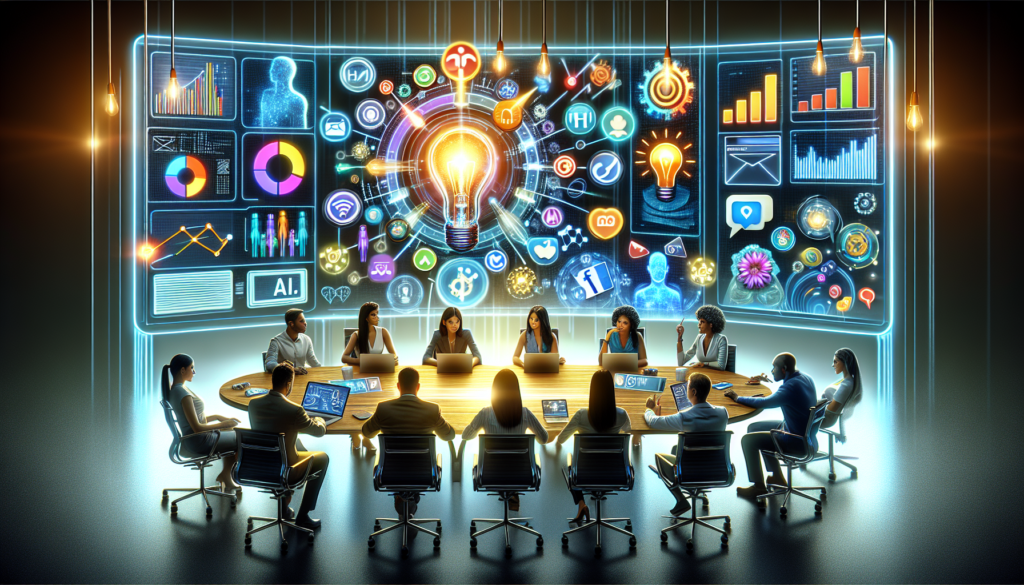As we stand on the brink of 2025, the marketing landscape is poised for a transformation, largely driven by the burgeoning field of AI marketing. If this phrase conjures up images of robotic drones selling holidays—think again! AI in marketing is more about using advanced technology to make smarter, more informed decisions, saving time and maximizing results. Let’s delve into how “AI marketing in 2025” is setting the stage for this revolution.
The Cool Kids on the Block: AI Apps in Marketing
Content creation has always been a cornerstone of AI marketing. But AI marketing in 2025 is getting an upgrade. Picture this: you’re sipping your morning coffee as Taskade apps jot down content ideas, Adobe Firefly crafts vibrant images, and copy.ai whips up compelling copy. These tools aren’t just nifty—they’re revolutionizing how marketers operate by slicing hours off mundane tasks and sharpening campaign metrics. Vondy AI stands out, integrating seamlessly to make the whole process a breeze.
Pros
- Efficiency Boost: Spend less time on repetitive tasks.
- Diverse Content Generation: Generate various content quickly, allowing for more robust A/B testing.
- Cost-Effective: Reduce costs associated with hiring additional manpower.
Cons
- Learning Curve: Adopting new tools can require time and training.
- Potential Over-reliance: There’s a risk of becoming too dependent on AI, at the expense of creativity.
Reading the Future: Predictive AI
Predictive AI marketing in 2025 isn’t a crystal ball, but it’s pretty close. It uses past data to predict future trends and consumer behavior, enabling marketers to craft targeted campaigns with precision timing. According to Harvard Business School, this could mean sending offers when a customer is most likely to buy or forecasting sales trends to plan effective campaigns.
Pros
- Enhanced Targeting: Know exactly when and how to engage with customers.
- Improved ROI: Maximize return on investment by striking at the right moments.
- Better Customer Insights: Gain a deeper understanding of customer preferences and behaviors.
Cons
- Data Dependency: Relies heavily on accurate and sufficient data.
- Privacy Concerns: Raising ethical issues about data use and privacy.
Generative AI: The Search Game Changer
Generative AI is redefining search. With Google’s Generative Search Experience and Bing’s Copilot, searches are becoming more conversational, akin to chatting with a knowledgeable friend. This shift might pose challenges for marketers, as traditional SEO is altered. The focus now is on optimizing content for voice search and adapting to fewer clickable links. This enhances your AI marketing in 2025.
Pros
- Conversational UI: Offers a more engaging search experience.
- SEO Evolution: Encourages innovations in SEO strategies.
- Accessibility: Enhances voice search, making it useful for impaired users.
Cons
- SEO Challenges: Potential reduction in web traffic due to direct answers.
- Technology Dependency: Increased reliance on AI systems for maintaining visibility.
The Human Touch: Why It Matters
No matter how advanced AI becomes, it’s unlikely to replace human marketers. While 55.5% of people speculate that AI might take over, the reality is more nuanced. AI is excellent with data but lacks the emotional intelligence needed for moments like an empathetic response or a well-timed joke that strikes a chord with audiences. Human creativity and emotional understanding remain irreplaceable in building strategies for AI marketing in 2025.
Pros
- Emotional Connection: Ability to connect with audiences on a personal level.
- Creativity: Humans can think outside the algorithm, coming up with unique ideas.
- Adaptability: Readiness to adapt to cultural nuances and trends.
Cons
- Resource Intensive: Humans require more resources than AI processes.
- Potential for Error: Unlike AI, humans can make subjective errors.
Conclusion
As we weave AI into the fabric of digital marketing in 2025, it becomes clear that this technology isn’t here to replace us—it’s here to enhance our capabilities. By freeing up time spent on tedious tasks, AI allows marketers like you—to focus on strategy and creativity. So, let’s embrace these tools, ensuring we keep the human touch alive. After all, marketing is as much about science as it is about the art of connection.
Feel free to dive into these AI tools—they’re more than just fancy gadgets; they’re the key to unlocking smarter AI marketing in 2025.
Melvin C Varghese is an author with more than 8 years of expertise in DevOps, SEO and SEM. His portfolio blogs include a Digital Marketing blog at https://melvincv.com/blog/ and a DevOps blog at https://blog.melvincv.com/. He is married with 2 small kids and is a simple person who eats, sleeps, works and plays. He loves music, comedy movies and the occasional video game.

